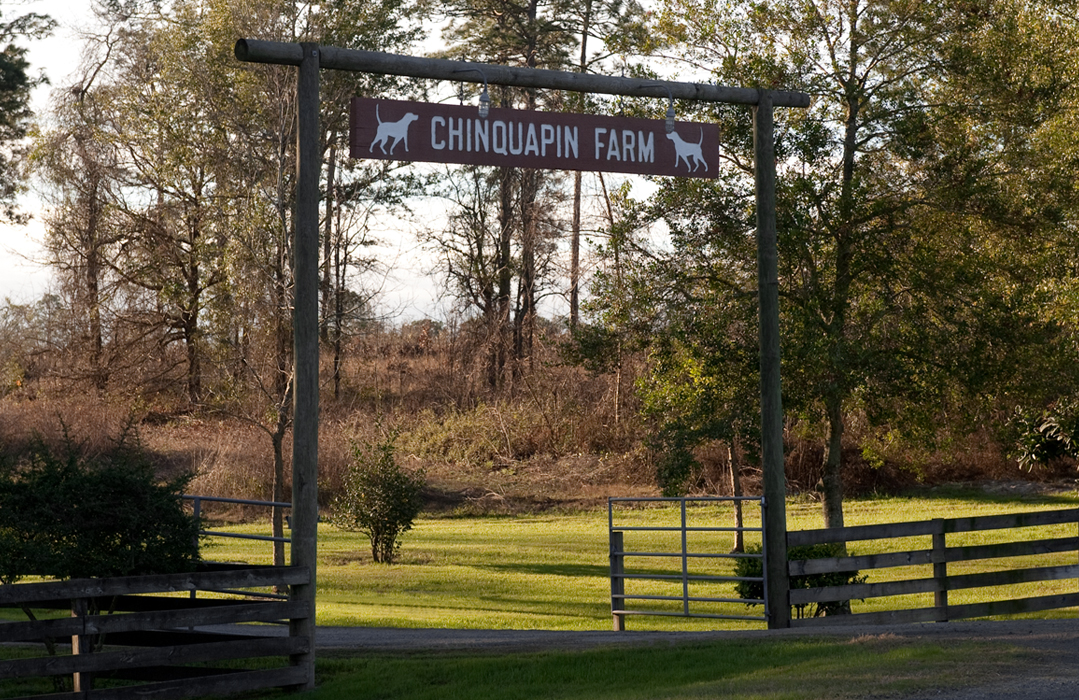Many a friendship has been inspired by a mutual love of bird dogs. My favorite story of such a friendship is that of T. Jack Robinson and Edward L. “Ted” Baker. That friendship spawned many others, and led to the breeding and development of legendary All-Age and Shooting Dog Champions over six decades and a premier wild bird field-trial Championship celebrating its 50th Anniversary.
In the 1960s two young men, just out of Service, were starting work under their fathers in family businesses, one in Jacksonville, one in Dayton (Tennessee). Both had been sired by quail hunters and in boyhood become avid bird hunters. Both were destined to be hard driving CEOs and Hall of Fame trialers.
T. Jack Robinson’s family business was making underwear, later athletic uniforms and other garments as well. Ted Baker’s was sand and gravel, concrete and lightweight aggregate.
Ted’s father had come home from the Pacific War a decorated Marine. When his business began to prosper he rented, then bought, quail lands an hour west of home and put together Baker’s Acres, later named Chinquapin Farm for a native plant that thrives there. It had been pineland-range-cow pasture from which pine stumps had been dug for explosive manufacture. It was lime rock based and covered in sand, wire grass and jack oaks with occasional pines, and no surface water. Quail loved it.
T. Jack’s hunting lands were along the Tennessee River Valley and on the Cumberland Plateau, natural farmland-quail and upland grouse habitat. Both young men became interested in better bird dogs, read about them in the American Field.
T. Jack’s father introduced him by phone to R. W. (Dick) Riggins of Knoxville, a customer (he managed a JC Penny store). Riggins owned the day’s most famous bird dog, Riggin’s White Knight. Riggins invited T. Jack to visit him, saying “I will give you a puppy.”
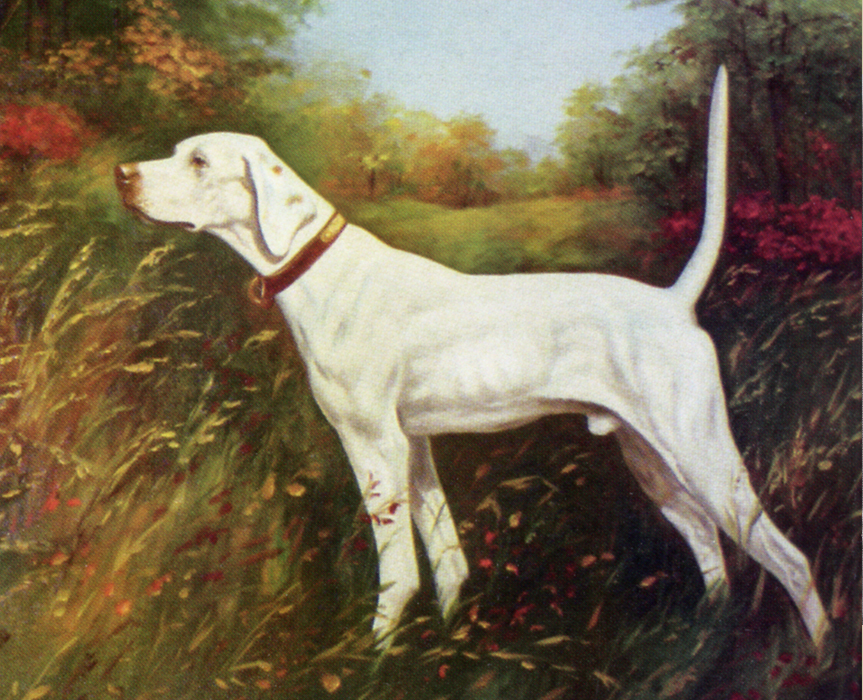
Riggins White Knight
“When I got there I found acres of puppy lots filled with white pointer puppies of all ages, all he said offspring of Knight. I picked out a female, and left with it saying sincere thanks. Two days later I got an envelope from Mr. Riggins containing a bill for $150 for the pup plus the costs of vaccinations and worming. It equaled a half month of my pay. The pup became my first trial dog.”
Ted’s father Mr. Tom did not give a dam about field trials. But E. A. “Red” Weddle, an old field trial hand who lived and with his son Doug ran a restaurant at Lake City, encouraged Ted to try the sport. Red recognized Chinquapin Farm would make ideal trial grounds and pushed Ted to sponsor a trial there. In 1969 Ted did, first reorganizing the defunct Suwannee River Field Trial Club. Red was named President, Ted Secretary, and the first trial was set for December 17, 1969.
Weeks before, a new clubhouse-horse barn and kennels for handlers were completed. Ted guaranteed a $1,000 purse for the Derby, $2,500 for the All-Age. That attracted seventeen entries in the Derby, forty-one in the All-Age, and many of the deep-south’s pro handlers, including Fred Arant, George Moreland, Fred Bevan, Bill Martin, George Evans, Bob Lamb, U.L. Hudson, Dick Lynes, Bud Brown and most significantly, Bill Rayl.
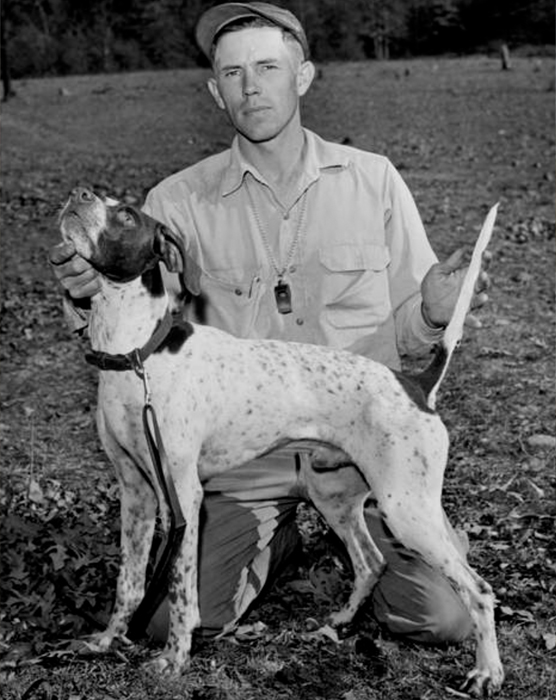
Bill Rayl
Bill Rayl’s influence on T. Jack and Ted would be monumental, as demonstrated at that first Chinquapin trial. How did it come about?
T. Jack had been referred to Bill by Phil Brousseau who’d had a trial dog or two for T. Jack but was withdrawing as a for-the-public trainer-handler. Bill needed a sponsor for a summer pupil and in exchange offered T. Jack an option to buy Endurance on his return from Canada for $1,000. That fall, 1968, Endurance won the U.S. Open Chicken Championship, but Bill kept his word so T. Jack acquired the Champion for $1,000. Endurance would win the Continental for them in 1970.
Endurance’s son Omen would win the Derby and All-Age at the first trial at Chinquapin in December 1969. (Endurance placed third in the All-Age).
Endurance would prove a remarkable breed-on sire, producing 47 winners including Hall of Famers Evolution and Little Diamond. Evolution produced 222 winners with 1,627 placements, including Champions Arrival (HOF), Heritages Premonition (NC), Glenwood Cameo, Roll On Kizzy, Paper Rosie, Flatwood Bill, The Invader, Four Miles Buzz, Spats, Mill Worker, Kilsyth Jack and most significant, T. Jack’s Redemption.

Evolution
Redemption placed 6 times and sired 39 winners including Champions Redemption’s Reward (Purina Dog-of-the-Year winner for T. Jack), Flatwood Joe, Robin’s Nest Addition, Redemption’s Victory, A Big Secret, Prevail, Wiregrass Julie, Mesach, Flash of Fire, Absolute Belle, Barshoe Curmudgeon, Revade and Tight Squeeze.
Omen died young, but Bill and T. Jack said he might have been the best dog they ever had.
Meanwhile Ted and Bill Rayl had made a connection, thanks to Ted’s Jacksonville friend Tom Kennard, a true character of the field trial world.
Thomas O. Kennard, Jr. D.V.M. studied at Auburn University Veterinary School and while there looked after the string of Clyde Morten, the most famous All-Age handler of all time. As a result, Dr. Tom sponsored major-circuit bird dogs all the rest of his life. And he loved Ted Baker.
He was a very smart real estate investor as well, specializing in small shopping centers around Jacksonville. Soon real estate eclipsed veterinary medicine in Doc’s world, but not bird dogs. He would have dogs with pro handlers all his adult life, in later years in partnership with Ted Baker and handled by Fred Dileo for whom he became a devoted owner. Doc had a curious turn of mind and great difficulty making decisions, on which he typically switched sides many times.
In 1968 Doc had a coming derby with Bill Rayl named Bill Possessed, a son of his Ch. Possessed out of Doc’s blue-hen brood bitch Myora Everglades Belle. To get Ted really interested in trials, Doc contemplated selling Bill Possessed to Ted.
Bill Rayl had high hopes for Bill Possessed. But as with all decisions, Doc was having difficulty making up his mind. Finally, after countless delays, Doc made the sale. A few days later, in January 1969, Bill Possessed won the Continental Derby Championship for Ted and Bill Rayl. Doc had made a good decision. Ted Baker was hooked for life on field trials.
A bird-dogging bond was thus forged among Bill Rayl, T. Jack and Ted, and Tom Kennard.
In December 1969 began the trials of Suwannee River Field Trial Association at Chinquapin Farm. As recited above, T. Jack’s Omen won the Derby and All-Age and his sire Endurance placed third for Rayl.
In 1979 the All-Age became the Florida Open All-Age Championship, now celebrating its 52nd year.
The First Trial at Chinquapin in 1969
Hal Davis reported the first trial and many later ones, and he was a very good reporter. He describes the grounds and the handlers’ first reactions to them:
“These lands are ideal quail habitat and are especially suited to the purposes of showing a class dog. They are of a rolling contour, thinly scattered with pine and scrub oak trees, a clump of palmetto here and a group of Chinquapin there, with feed patches of several kinds of millet, corn, beans, indigo and benne scattered throughout. Bill Rayl described the grounds as a Dixie Plantation without briars, Ames courses without the sharp turns that prevail at Grand Junction. Other professionals viewing Bakers Acres for the first time likened the grounds to those of the Maytag Plantation at Union Springs, Ala.”
(One handler, Fred Arant, complained bitterly at the lack of a definitive layout of the courses. Ted heard him and was incensed. He sent club Vice President John Murphree to order Arant off and refund his entry fees. Arant immediately apologized and offered to stay over after the trial and lay out and mark the courses.
He worked at it two weeks, at the same time working his string. Those same courses are used today, sixty years later, for the Florida Championship, with water barrels for the dogs planted strategically all along them. Fred Arant never missed the trial as long as he campaigned.
Judges for the first trial were Casey Black, son of Bert Black, pro of an earlier generation, and Eugene Brooks, a seasoned competitor and judge, both of Albany and accustomed to working together.
Second in the Derby was won by Double Rebel, for Fred Arant, son of A Rambling Rebel whose owner Steve Richardson was riding in the gallery. In the All-Age second went to Pineland Kate for big George Moreland which had in the spring won the Continental Open All-Age Championship.
Bill Rayl had introduced T. Jack and Ted to one another at the 69 Continental and suggested they get together, and after T. Jack’s marked success at Chinquapin that year, his dogs winning both stakes plus third in the All-Age, T. Jack was soon a Vice President and Director of the revitalized Suwannee River Association. He would never miss attending the Association’s trials the rest of his life. And he would become a devoted director of both the National Championship and the National Free-For-All Championship.
Nineteen-Seventy proved another banner year at Chinquapin. Ted raised the All-Age purse to $5,000 (no Derby stake was run) and 53 were entered. First went to setter Joe Crockett for owner Rudy Schulze and freshman pro George Clark of Louisiana, recently retired as an Army Major. Joe had four finds and Hal Davis quoted Clark saying “His nose is so high I can’t hunt him in the rain for fear he will drown.”
Second went to Flush’s Country Squire for S. H. Vredenburgh and John Rex Gates with Tommy Long scouting, with three finds and a big race; third was won by A Rambling Rebel for owner Steve Richardson, riding, Fred Arant and scout Joe Odom, his race in a 40-mile-an-hour wind with three finds.
Omen almost won again as he had in ‘69, this time with six finds, but it turned out the judge did not see birds on one of the six though reporter and marshal did. A thrilling trial with top notch competition among the continent’s best. The only sad note: T. Jack’s Endurance suffered a blown Achilles’ tendon.
Nineteen-Seventy One produced another great trial, with Derby (18) and All-Age (48) stakes. John Rex got the blue in the All-Age with a Vredenberg entry, Oklahoma Flush, on a big forward race and five finds. Second went to Schrock’s Little John for owner G. S. Schrock and handler Cecil Ladner, and third went to Omen for T. Jack and Bill Rayl.
Sadly, Omen died soon after. His had been a brief but spectacular career and he had played a big role in tying T. Jack’s affections to Ted, Bill Rayl and the Suwannee River organization. Ted’s Twenty Grand for Bob Lamb was praised by the reporter that year.
In the Derby, Texas Fight for Edmund Brown and John Rex took the blue, another future Hall of Fame dog. Second went to Kilsyth Sweet Sally for Mrs. G. M. Livingston and George Evans (Miss Geraldine rode her Passo Finos every brace). Third was awarded Taxi for Bill Rayl and T. Jack, another Endurance offspring, extending T. Jacks’s and Bill Rayl’s remarkable record with the bloodline at Chinquapin.
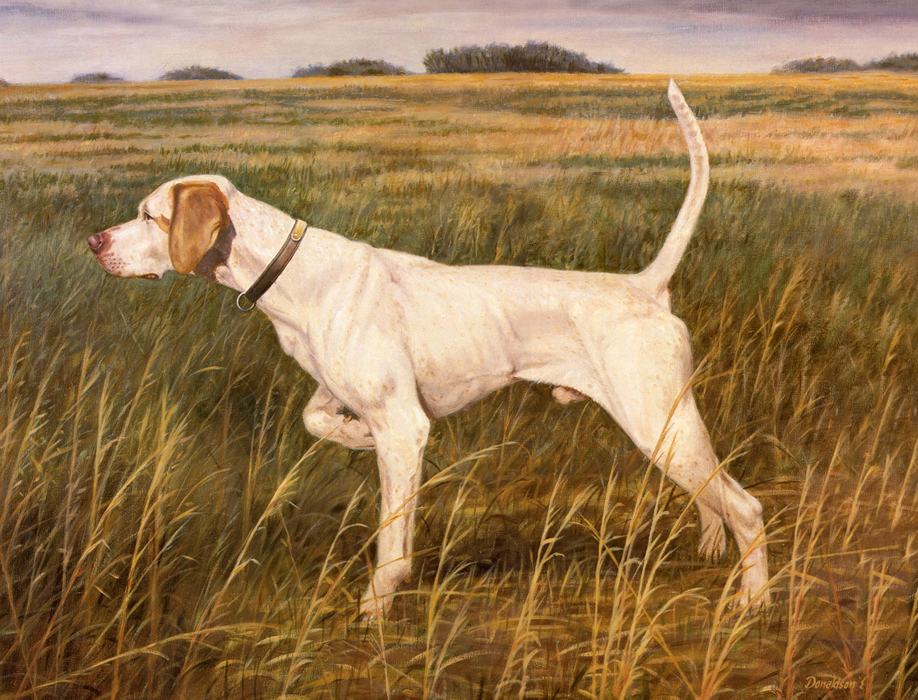
Texas Fight
Nineteen Seventy Four saw two Suwannee River trials, one in February the other in December. In the spring The Georgia Rebel for Arant, Chickaboom for Freddie Epp, and Santa Rosa Knight for E. E. “Pappy” Key took the $5,000 All-Age money. In the Derby, T. Jack and Ted sponsored Evolution and Diamond Man to first and second, with Bill Rayl handling both.
Evolution would be a landmark Hall-of-Fame sire, his image featured in T. Jack’s stud ads for a decade and his offsprings’ and siblings’ names on the tongues of fans for two decades: Little Diamond (HOF) (sister) Arrival (HOF) Paper Rosie, Roll on Kizzy, etc., 13 Champions in all. Ted would handle Evolution for T. Jack to the Region 3 A-A Championship at Chinquapin.
In the December ‘74 Chinquapin trial White Knight’s Button for Jack Fiveash and Collier Smith would take the All-Age on the way to the Purina Award and HOF, and Chicago Fire for Bill Rayl and R. E. Dubenhostel, another Endurance pup, would take the Derby.
In 1975 the Club ran a member’s stake won by Endurable, another Endurance son, for Tom Kennard. Runner-Up went to Special Appointment, a Riggin’s White Knight son, for Hugh H. Branch.
The All-Age drew 53, including 6 setters, and these handlers: Bill Rayl, Bob Lamb, Wallace Sessions (resident trainer at Chinquapin), Tom Wiggins, George Hodge (who won first and second with Claud Kidd’s Reedy Fork Bud and D. A. Denies’ Dean’s Lucky Boy), Collier Smith, John Rex Gates, George Evans, Ed Tenbroeck, Fred Arant, Bobby Watson, Freddie Epp and George Moreland.
The Derby drew 27 and was won by Gail Possessed for Freddie Epp and owner Al Blanton. Second went to Button’s Calypso for Tommy Wiggins and owner Pappy Key, and third to Boy’s Fireball for George Hodge and owner Ted Baker.
Then came 1976 and another great trial, 66 entered in the All-Age with Just-a-Nip winning for Freddie Epp and Quailwood Farm; Builder’s Addition second for new owners T. Jack and Ted Baker with Bill Rayl handling; and Glendale taking third for Robin Gates, just moved over from shooting dogs, and owner Dr. J. D. Hill.
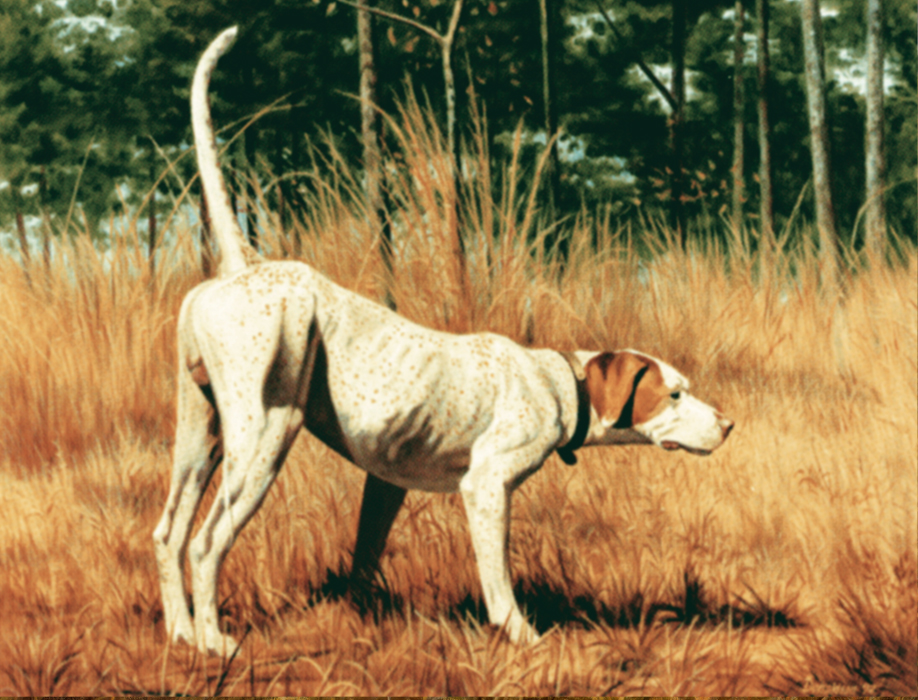
Builder’s Addition
The Derby drew 33 and was won by Builder’s Country Boy, another Builder’s Risk son handled by Bill Rayl and owned by Bill Ball. Second went to Kilsyth Billy Boy for George Evans with owner Miss Geraldine Livingston riding a black walking horse (not a Passo Fino!) to watch; and third to Over There for Robin Gates and the S. H. Dykes Sr. & Jr. , owners.
A Member’s Shooting Dog with 8 entries provided laughs.
The Suwannee River Association Trials were now well established as key events on the All-Age Major Circuit.
1978 proved a special and unique year at Chinquapin, but for a sad reason. In June 1977, Mrs. G. M. Livingston, owner of Dixie Plantation, died. Whether the Continental Trials would continue there was up in the air. In January 1978, Ted Baker offered Chinquapin to the Continental Derby Championship to run on. It was won there by Barshoe Buttonhook, bred and owned by Lee West, and handled by Bud Daugherty.
Miss Geraldine Livingston was on hand to ride, and stayed over to ride and watch the Suwannee River All-Age which drew 69 and was won by Special Duty for John Rex Gates and owner Keith Gardner. Second was awarded Man’s Knighted Squire for Bud Daugherty and owner T. M. Schooley. Third was won by Just-A-Nip for Ed Epp and new owner Dr. Tom Kennard (she had won first for Ed’s father Freddie and Quailwood Farm in 1976).
Also in 1978 the Club ran a Members Shooting Dog, won by Boy’s Fireball for Jack Fiveash. Second went to Duel, another Evolution son for Ted and T. Jack, with T. Jack handling. Third went to Jason Hooker owned and handled by Ted.
* * *
But first go back to a fateful moment in 1976.
Bill Rayl has an owner with a good dog and a big problem. He is a builder, caught in a home-building recession. His name is Bill Ball. He needs the $10,000 the dog is worth (a lot of money in 1976).
Rayl is blue, fearful a well-heeled Gates owner will sweep up his best dog.
T. Jack and Ted are both also feeling hard times in their businesses. Neither has $10,000 to buy Bill Rayl’s owner’s dog. But each decides he can handle $5,000, so together they buy Builder’s Addition from Bill Ball. And Builder’s Addition wins the first Florida Championship in 1979.
In 1980 he wins the National Championship for the threesome, T. Jack, Ted and Bill Rayl.
He also won the Invitational, where he won Runner-Up twice. He won the International Pheasant, 19 placements in all. He produced 41 winners with 246 wins, including Champions Robin’s Nest Addition, Condo, Addition’s Go Boy, Rebel Addition, and Chinquapin’s Addition.
